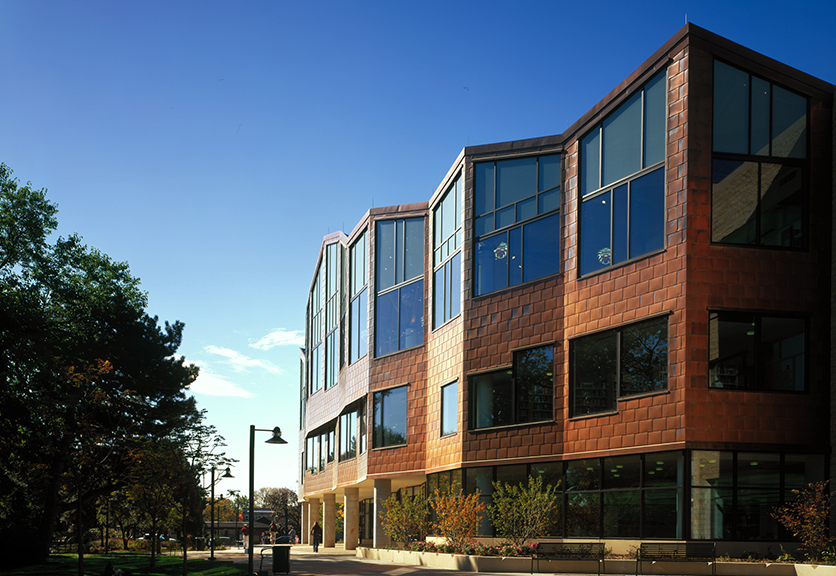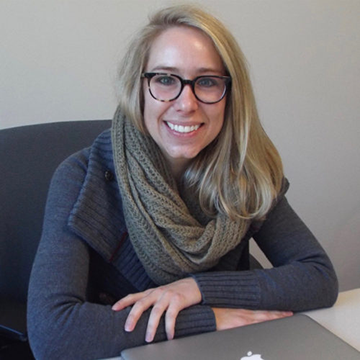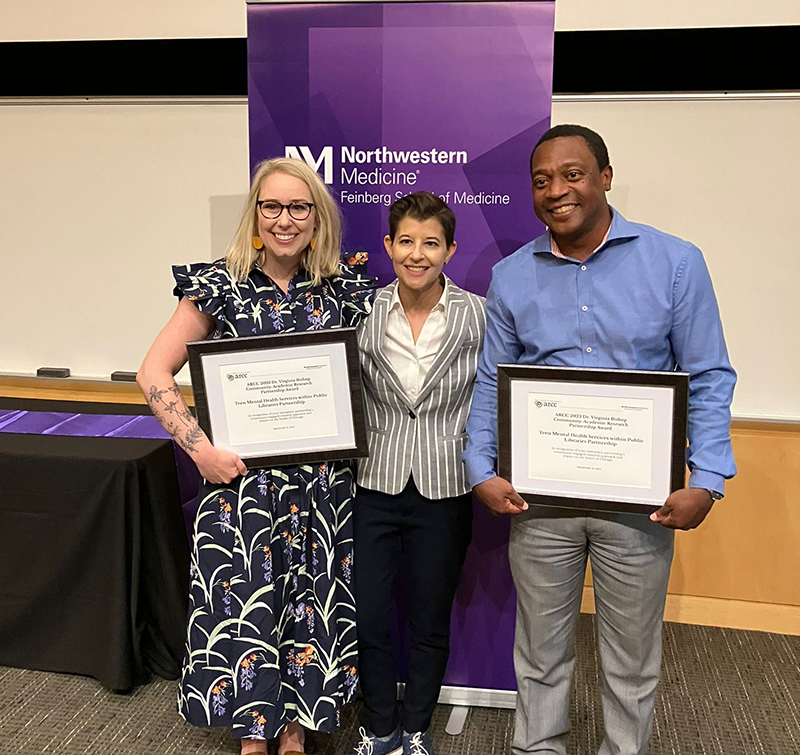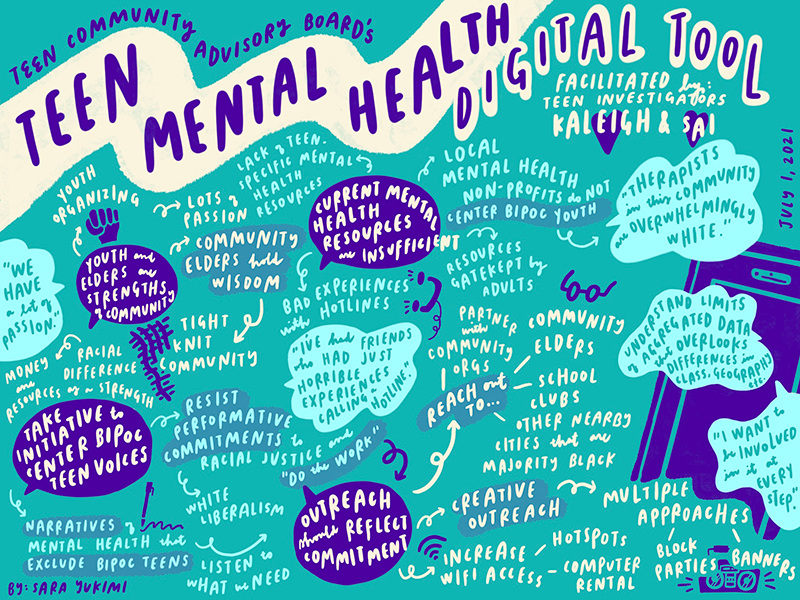The next service coming to your local library: mental health tools for teens

By Andrew Nellis — Sept 26, 2023
Quick summary:
- In response to growing need, libraries around the country have become de facto public health centers offering a wide range of support services from Narcan to mental health consultations.
- Ashley Knapp, PhD, is partnering with Robert Simmons, MA, and the Oak Park Public Library, to launch a digital mental health application that will help teens struggling with anxiety.
- In a recent paper published in Frontiers in Digital Health, Knapp, Simmons, and their teams analyzed interviews with library workers using the “Consolidated Framework for Implementation Research” to refine the app’s development.
- The team has also received the 2023 Dr. Virginia Bishop Community-Academic Research Partnership Award for their work. The award was given by The Alliance for Research in Chicagoland Communities (ARCC)
Over the past decade, adolescent mental health concerns have experienced significant increases across the country. Even before the COVID-19 pandemic, nearly 40% of high school students expressed feeling persistent sadness and hopelessness, according to the Centers for Disease Control and Prevention’s (CDC) Youth Risk Behavior Survey.
For many students, particularly those from historically underrepresented racial and ethnic (HURE) backgrounds, substantial barriers stand in the way of accessing mental health care.
To address that disparity, a team of researchers led by Ashley Knapp, PhD, assistant professor of psychiatry and behavioral sciences at Northwestern University, has partnered with Robert Simmons, MA, and the Oak Park Public Library to create a web-based digital mental health (DMH) service to help teenagers understand and navigate their anxiety.

It is critical we step up and do right by our teens, the majority of whom are struggling with their mental health and not receiving care.”
“As recent news stories relate, our teens are not ok,” said Knapp, who is also a member of the Institute for Public Health and Medicine’s (IPHAM) Center for Dissemination and Implementation Science. “Most are struggling with their mental health and not receiving proper care. This is especially true for teens from HURE backgrounds. The goal of our partnership is to use a common community gathering space, the public library, to increase access to mental health care and co-create the service with teens from HURE and other backgrounds to fit their needs.”
In a recent paper, Knapp, Simmons, and their teams reported on their interviews with Oak Park Public Library workers to better understand their needs and the environment where the new resource will launch.
An open door
Robert Simmons, Oak Park Public Library’s Director of Social Services and Public Safety, recalled when he first joined the library in 2016 and immediately recognized the library’s shifting role within the community.
“There’s a significant disparity in this country when it comes to access to healthcare and housing,” said Simmons. “Libraries have become de facto community centers. They’re free spaces with embedded systems to support patrons in vulnerable situations. People are using libraries not just for books, but to gain resources they cannot get any other way.”

Like many libraries around the country, Oak Park has been adapting to an increased demand for resources beyond books, with many visitors now seeking help with affordable housing, chemical dependency, and medical care. Some patrons, like those experiencing homelessness, visit the library simply because there is nowhere else to go.
In response, branches nationwide have begun offering a range of resources like free Narcan, in-house therapists, job search workshops, and cooling centers.
Teen mental health is one area that Simmons and his team have been working to support for years. Since 2019, the library has hosted an on-site, licensed clinician two days a week who can connect adult patrons to mental health services. While hugely beneficial, the library wanted to expand its services and give patrons more options.
When Knapp approached the library as a potential site for developing a digital mental health service aimed at teens, Simmons said it was an easy yes.
Community buy-in for a community intervention
Digital mental health services, often delivered as mobile applications or through websites, have been around for years. However, getting those services to the people who need them most is an ongoing challenge.
“DMH services are hailed in scientific literature, but whenever a team tries to implement them in the real world, they tend to underperform,” said Knapp. “We think a key reason they fall flat is because the community’s perspective isn’t genuinely integrated into development and implementation.”
One example of that disconnect, Knapp explained, is access to smartphones. While the literature often states that over 90% of teens have access to a smartphone, it doesn’t acknowledge that, for many, access is limited. Some teens, especially those living with poverty, might share a phone with their family or not have mobile data, forcing them to visit places like McDonald’s or the library to get online.
Before developing the intervention, Knapp wanted to understand those challenges as much as possible.
With the help of a Partnership Development grant awarded by the Alliance for Research in Chicagoland Communities (ARCC) at Northwestern, Knapp, Simmons, and their teams held adult and teen community board meetings, led by Teen Investigators, with all the stakeholders who’d be involved in the new intervention — library workers, community members, and teens themselves — to better account for what the community needs and wants.

In the interviews with the Oak Park Public Library workers, they found that library workers were uniquely suited to support the new intervention as many already worked with teens as part of their normal duties and had earned the patrons’ trust as conduits of unbiased information.
Barriers did arise, including concerns that some in the broader community might see the intervention as an overreach on the part of the library. But identifying those barriers, Knapp explained, was precisely why they took this step.
“There’s a long history of scientists coming into communities of color with their own agendas, not listening to the people they’re trying to help, and causing a lot of harm as a result,” Knapp said. “We are taking a very different approach.”
With their preliminary research complete, the team is now moving to address the barriers that arose during their interviews. At the same time, Knapp and her colleagues are incorporating input provided by Oak Park teens regarding what they would find most helpful in a digital mental health service. For a date, Knapp hopes to have the app in early testing by the end of this year.
The team has already received recognition for their work. In September of this year, they received the 2023 Dr. Virginia Bishop Community-Academic Research Partnership Award for their collaboration. The award was given by The Alliance for Research in Chicagoland Communities (ARCC).
“It is critical we step up and do right by our teens, the majority of whom are struggling with their mental health and not receiving care,” added Knapp. “Libraries are free, open to the public, and have worked to earn the trust of their communities — making them promising outlets for offering mental health support.”